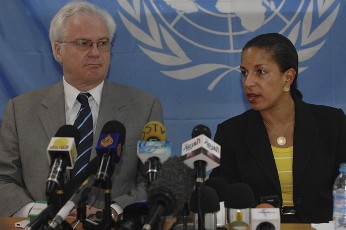Sudan says cancelling meetings with UNSC ‘intentional’
May 24, 2011 (KHARTOUM) – A Sudanese official acknowledged that the government deliberately cancelled planned meetings of second vice-president Ali Osman Taha and foreign minister Ali Karti with the delegation of the United Nations Security Council (UNSC) that was visiting the country.

The official in the ruling National Congress Party (NCP) in charge of Abyei dossier al-Dirdiri Mohammed Ahmed said this move was meant to send a message to the UNSC but did not elaborate.
“Messages are given and read,” he said. He also downplayed US threats about the halt to normalizing ties unless North withdraws from Abyei saying that Khartoum “had enough of this talk”.
UNSC arrived last weekend as the Sudan Armed Forces (SAF) entered the North-South border region of Abyei and asserted control over it. The Sudan People’s Liberation Army (SPLA) withdrew down south as the SAF advanced.
Khartoum justified the action saying it was in retaliation to an ambush near Abyei blamed on the SPLA. The SAF convoy that came under attack was escorted by peacekeepers from the United Nations Mission in Sudan (UNMIS).
Initially the Sudanese government said 22 soldiers were killed and dozens have gone missing in the aftermath of the attack. On Tuesday, the Sudanese ambassador to Kenya Kamal Ismail Saeed said today that 197 northern troops were killed or are missing.
But the United Nations later said that the actual figures are “much smaller”.
Yesterday the Sudanese president Omer Hassan Al-Bashir vowed not to pull out from Abyei stressing the area belongs to the North despite calls by Western countries and UNSC for an immediate withdrawal.
Other officials suggested that they would leave the region if security arrangements are reached such as having UNMIS patrol the region on an exclusive basis.
This week the United Nations said that widespread looting and burning have taken place in Abyei following the SAF takeover.
The UN and aid agencies said up to 40,000 had now been forced to leave their homes and were moving deeper into south Sudan.
The UN spokeswoman Hua Jiang said today that Arab Misseriya militias started pushing further south after people left the region’s main settlement, Abyei town.
“There are reports that they are moving south,” she said.
She also said that 14 rounds were fired when the United Nations helicopters took off from a U.N. compound in Abyei town today but they landed safely. Jiang blamed it on the Misseriya.
A monitoring group said on Wednesday that satellite images indicate evidence of “war crimes” committed by SAF in Abyei.
“These images provide supporting documentary evidence of war crimes and crimes against humanity in Abyei,” said John Bradshaw, director of the Enough Project campaign group, part of the coalition backing the satellite work.
The 2005 Comprehensive Peace Agreement (CPA) promised Abyei residents a referendum over whether to join north or south, but that did not take place as neither could agree on whether members of the north-associated cattle-herding tribe of Misseriya should be allowed to vote alongside the south-linked tribe of Dinka Ngok.
The South already voted last January in a separate referendum in favor of secession which will become official next July.
In a related issue the UN Secretary General Ban Ki Moon proposed a new peacekeeping force of some 7,000 blue-helmeted troops for south Sudan once it secedes.
The UNMIS mandate is due to expire next July and Khartoum made it clear that it wants the peacekeeping mission which has presence all over the country to leave by then.
Diplomats and U.N. officials told Reuters on condition of anonymity that Khartoum does not want UNMIS to leave Sudan altogether though the Sudanese government would prefer that it be less visible in Khartoum.
Ban’s report said the new force should be called the United Nations Mission in South Sudan, or UNMISS.
The proposed new force will have to be approved by the UNSC.
(ST)

